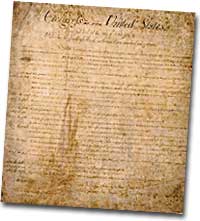What is the most important right granted to United States citizens?

18a. The Bill of Rights

Although James Madison was the youngest member of the Continental Congress, his leadership was a critical factor in the development of American authorities. Madison proposed the Virginia Plan, he authored some of the Federalist Papers, and he wrote the Beak of Rights.
The outset national election occurred in 1789. Along with President Washington, voters elected a large number of supporters of the Constitution. In fact, almost half of the ninety-1 members of the first Congress had helped to write or ratify the Constitution.
Non surprisingly, given Anti-Federalists' opposition to the stiff new cardinal government, merely eight opponents of the Constitution were sent to the House of Representatives. Most Anti-Federalists concentrated their efforts in state politics.
Protection of Individual Rights
An immediate issue that the new Congress took up was how to modify the Constitution. Representatives were responding to calls for amendments that had emerged as a chief issue during the ratification procedure. Crucial states of Massachusetts, Virginia, and New York (amongst others) had all ultimately supported the Constitution — but only with the expectation that explicit protections for individual rights would be added to the highest law of the land. Now that supporters of the Constitution controlled the federal government, what would they do?
The legal tradition of having a precise statement of individual rights had deep roots in Anglo-American custom. And then it'south not surprising that the kickoff Congress amended the Constitution by adding what became known equally the Bill of Rights.

Amendment 10: "The powers not delegated to the United States by the Constitution, nor prohibited by information technology to the States, are reserved to u.s.a. respectively, or to the people."
James Madison, at present a fellow member of Congress from Virginia, once over again took the leading role crafting proposed amendments that would be sent to the states for approval. Madison skillfully reviewed numerous proposals and examples from land constitutions and ultimately selected nineteen potential amendments to the Constitution.
Every bit one might expect, the nationalist Madison took intendance to make certain that none of the proposed amendments would fundamentally weaken the new central government. In the end, ten amendments were ratified in 1791.
Ten Amendments
These first ten amendments to the Constitution became known as the Bill of Rights and still stand up as both the symbol and foundation of American ideals of individual liberty, limited government, and the rule of law. Most of the Bill of Rights concerns legal protections for those accused of crimes.
Rights and Protections Guaranteed in the Bill of Rights
| Amendment | Rights and Protections |
|---|---|
| Kickoff |
|
| Second |
|
| Third |
|
| Fourth |
|
| Fifth |
|
| Sixth |
|
| Seventh |
|
| Eighth |
|
| Ninth |
|
| 10th |
|
For example, the fourth through 8th amendments provide protection from unreasonable search and seizure, the privilege against cocky-incrimination, and the correct to a off-white and speedy jury trial that will exist free from unusual punishments.
The First Subpoena, perhaps the broadest and most famous of the Beak of Rights, establishes a range of political and civil rights including those of free speech, assembly, printing, and organized religion.
The last two amendments, respectively, spell out that this listing of private protections is non meant to exclude other ones, and, by contrast, set along that all powers claimed past the federal regime had to be expressly stated in the Constitution.
The Full Text of the Bill of Rights
Amendment I Congress shall brand no constabulary respecting an establishment of religion, or prohibiting the costless exercise thereof; or abridging the freedom of speech, or of the press; or the right of the people peaceably to assemble, and to petition the Government for a redress of grievances.
Subpoena II A well regulated Militia, being necessary to the security of a free State, the right of the people to keep and acquit Arms, shall non be infringed.
Amendment III No Soldier shall, in time of peace be quartered in any firm, without the consent of the Owner, nor in fourth dimension of state of war, but in a way to exist prescribed by law.
Amendment Four The right of the people to be secure in their persons, houses, papers, and furnishings, against unreasonable searches and seizures, shall not be violated, and no Warrants shall issue, simply upon likely crusade, supported by Oath or affirmation, and particularly describing the place to exist searched, and the persons or things to be seized.
Subpoena V No person shall be held to answer for a capital, or otherwise infamous law-breaking, unless on a presentment or indictment of a Grand Jury, except in cases arising in the country or naval forces, or in the Militia, when in actual service in fourth dimension of War or public danger; nor shall any person be discipline for the same offence to be twice put in jeopardy of life or limb; nor shall be compelled in whatsoever criminal instance to exist a witness confronting himself, nor exist deprived of life, liberty, or holding, without due process of police; nor shall private holding be taken for public utilize, without just bounty.
Amendment VI In all criminal prosecutions, the accused shall enjoy the correct to a speedy and public trial, past an impartial jury of the State and district wherein the crime shall have been committed, which commune shall accept been previously ascertained by police force, and to be informed of the nature and crusade of the accusation; to be confronted with the witnesses confronting him; to accept compulsory procedure for obtaining witnesses in his favor, and to have the Aid of Counsel for his defense.
Amendment VII In suits at common police, where the value in controversy shall exceed 20 dollars, the right of trial by jury shall be preserved, and no fact tried by a jury, shall be otherwise reexamined in any Court of the United states, than according to the rules of the mutual constabulary.
Amendment VIII Excessive bail shall not exist required, nor excessive fines imposed, nor cruel and unusual punishments inflicted.
Amendment Nine The enumeration in the Constitution, of certain rights, shall not exist construed to deny or disparage others retained by the people.
Amendment X The powers not delegated to the United States by the Constitution, nor prohibited by information technology to the States, are reserved to the States respectively, or to the people.

While the Nib of Rights created no deep challenge to federal authority, it did respond to the central Anti-Federalist fear that the Constitution would unleash an oppressive primal government too distant from the people to be controlled.
Past responding to this opposition and following through on the broadly expressed desire for amendments that emerged during the ratification process, the Bill of Rights helped to secure wide political support for the new national regime. A first major domestic issue had been successfully resolved.
Understanding the Neb of Rights
The Bill of Rights remains an active force in contemporary American life as a major element of Ramble police. The meaning of its protections remains hotly debated. For case, the privilege to comport arms to support a militia, which appears in the second amendment, produces significant political controversy today.
More sweepingly, the extension of the Pecker of Rights to protect individuals from abuse not only past the federal government, just too from state and local governments remains an unsettled attribute of Ramble interpretation.
Originally, the protections were solely meant to limit the federal government, but with the fourteenth amendment's guarantee in 1868 that no state could deprive its citizens of the protections in the Bill of Rights this original view began to be expanded. To this day the Supreme Court has not definitively decided if the entire Bill of Rights should always be applied to all levels of government.
Source: https://www.ushistory.org/us/18a.asp
Post a Comment for "What is the most important right granted to United States citizens?"